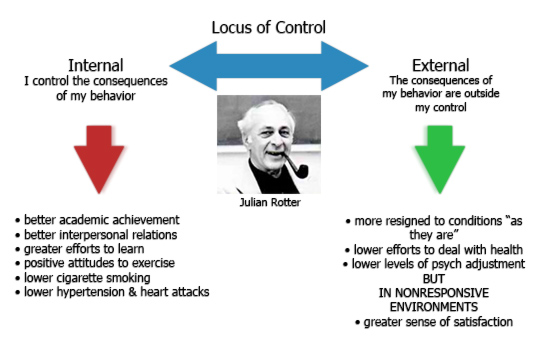Our locus of control describes how much credit or blame we take for the outcomes in our life. Someone with an internal locus of control then will be prone to take credit for their successes, as well as to take the blame when something goes wrong. On the other hand of course, someone with an ‘external’ locus of control will be more likely to blame their current situation on outside factors – the circumstances, other people or luck.
The concept comes from personality psychology and was developed by Julian B. Rotter and has been largely accepted and adopted by the wider community. It is included as one of the four ‘dimensions of core self-evaluations’ with the others being neuroticism, self-efficacy and self-esteem.
Why It’s Good to Be Internal
Of course this is an objective measure of a personality trait and it wasn’t devised so that there could be a ‘right’ or ‘wrong’ way to behave. However most psychologists agree that overall a central locus of control is preferable and more adaptive.
The reason for this is that you need to believe you can exert some form of control over your life in order to make any effort to bring about positive change. In other words, if you believe that everything is outside of your control, then you will remain forever a victim of circumstance because you won’t attempt to change anything. You need to believe you have power over your life in order to exert any.

At the same time an external locus of control can potential lead to a lower self-esteem. While you wouldn’t be as likely to blame yourself for things that go wrong with an external locus, you also wouldn’t give yourself the credit for anything that went right.
How to Develop an Internal Locus of Control
Surely some of us have a more internal locus or a more external locus by nature and through the way we’ve been brought up and our experiences. That’s not to say however that this can’t be changed, or that there’s no benefit to trying to change it.
The first thing to recognize is that we do have at least some impact on almost everything that happens to us. Even when something happens completely by chance, we still have some control over the event because we can choose how to react and how to adapt. In most cases though, if we were to do things differently we would find that there was another outcome. Failing a test doesn’t mean you’re not capable, but it might well mean that you didn’t put as much research and time into it. If your love life isn’t where you want it to be then you can blame the fact that you ‘never meet anyone’ or you can actually go about changing that by joining classes and trying online dating.
Using positive affirmations can help to reinforce this way of thinking in your mind, but likewise so can taking the effort to assess things that happen in your life and your actions. If you have an accident, fail a test, or your business plans don’t succeed then you should see this as an opportunity for learning and growth – so sit down with a pen and paper and write down the ways you reacted and how they could have been better.
And most importantly, start taking action. Look at the things you aren’t happy with and the negative patterns in your life, and start making efforts to alter them. Even if it’s just something small like learning to stop biting your nails – once you do this you will find that you start to see that you really can have an effect on the course your life takes.




